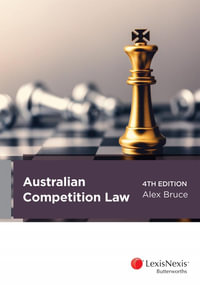
The Conceptual Structure of EU Competition Law
Restrictive Agreements
By: Csongor I. Nagy
Hardcover | 29 October 2024
At a Glance
Hardcover
$275.75
Aims to ship in 15 to 25 business days
Engaging in both positivist and evaluative approaches, Csongor Istvan Nagy conceptualizes the case-law in practical terms, outlining its paradigmatic changes and apparent contradictions. Chapters explore the purpose of competition law and the structure of competition analysis; the categories of anticompetitive object; the delimitation of object and non-object agreements; the borderline and recently emerged or emerging categories; the analytical framework of effects-analysis; and the consideration of general societal values. Nagy proposes key amendments, such as a balanced approach to formalism and substantiveness, a consistent concept of anticompetitive object, a sliding scale approach to effects-analysis, and a structuralist construction for exemption.
This book is an essential resource for academics and students in competition and antitrust law and European law. Its analysis of critical case-laws is also invaluable to legal professionals and practitioners in the field.
Industry Reviews
'This is an excellent and important addition to the academic literature on EU competition law. It provides a clearly-structured, succinct, well-drafted and knowledgeable analysis of the role of the prohibition on anti-competitive agreements under Article 101 as part of the fuller framework of antitrust rules, a parallel account to the excellent work of Ibanez-Colomo on the modernisation of Article 102. This book will be critical reading for all competition law scholars and practitioners and provide an effective source for the study of competition law at advanced and Masters levels.' -- Barry Rodger, University of Strathclyde, UK
'Conflicts escalate from crisis to war due to domestic, regional, and international influences. Most approaches ignore this complexity or are too technical for non-specialists. The authors employ graphic analysis - supplementing words with images - so the complexity of international conflict is part of the theorizing yet is understandable by all.' -- Douglas Lemke, Pennsylvania State University, US
ISBN: 9781035311835
ISBN-10: 1035311836
Series: New Horizons in Competition Law and Economics series
Published: 29th October 2024
Format: Hardcover
Language: English
Number of Pages: 275
Audience: Professional and Scholarly
Publisher: Edward Elgar Publishing Ltd
Country of Publication: GB
Dimensions (cm): 23.4 x 15.6
Shipping
| Standard Shipping | Express Shipping | |
|---|---|---|
| Metro postcodes: | $9.99 | $14.95 |
| Regional postcodes: | $9.99 | $14.95 |
| Rural postcodes: | $9.99 | $14.95 |
How to return your order
At Booktopia, we offer hassle-free returns in accordance with our returns policy. If you wish to return an item, please get in touch with Booktopia Customer Care.
Additional postage charges may be applicable.
Defective items
If there is a problem with any of the items received for your order then the Booktopia Customer Care team is ready to assist you.
For more info please visit our Help Centre.























